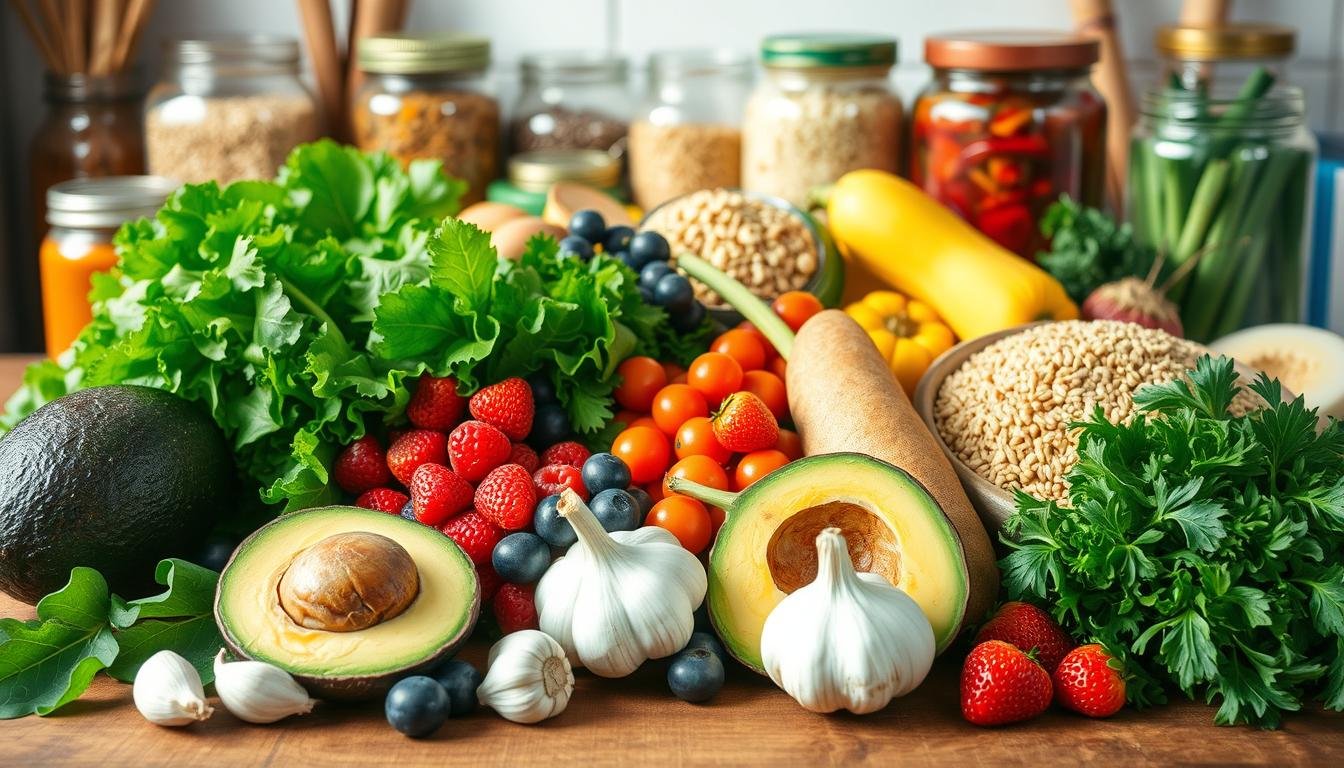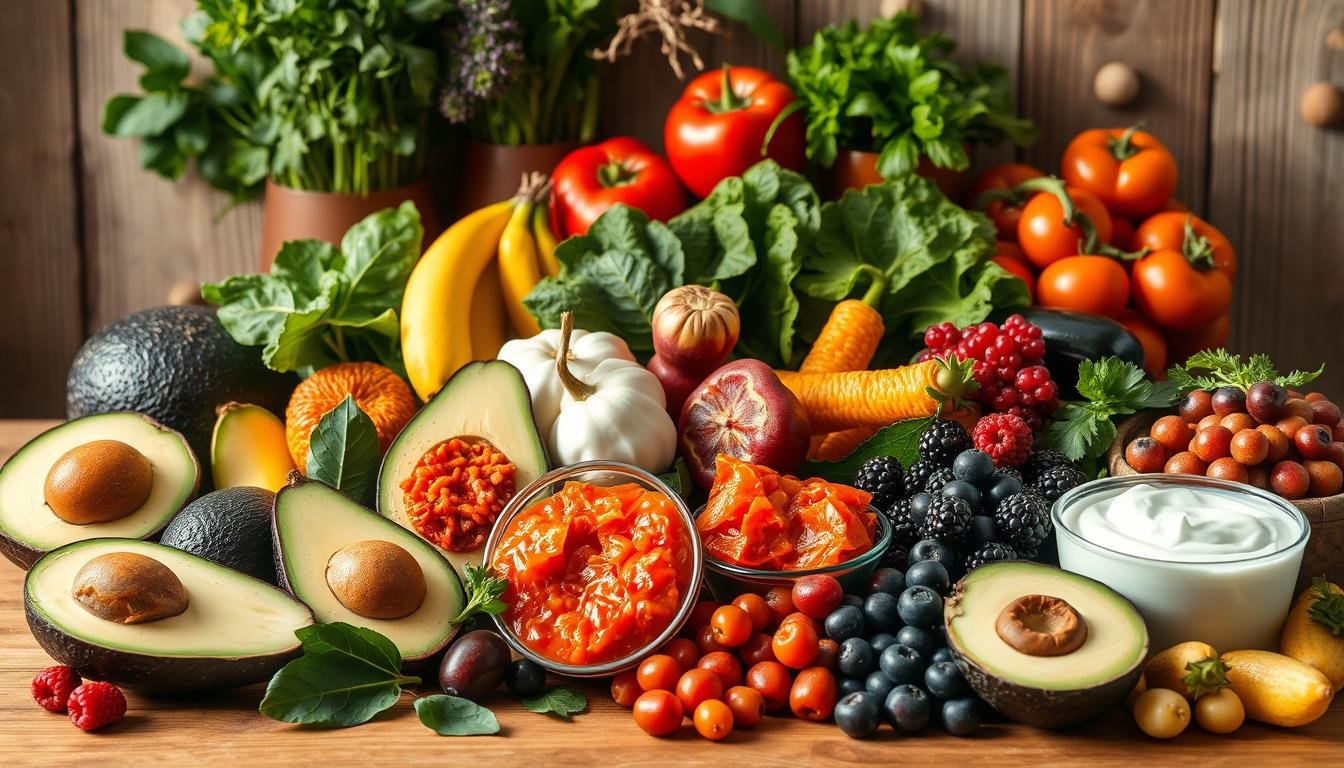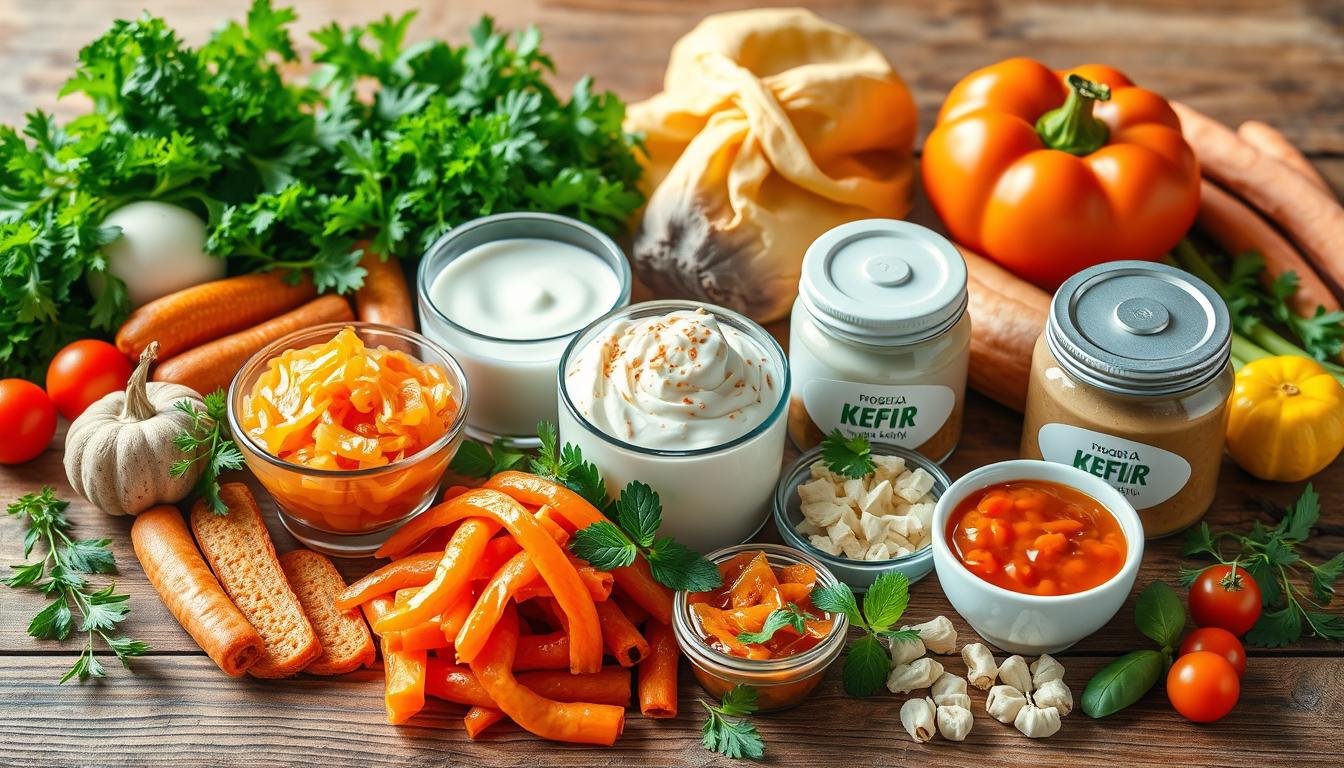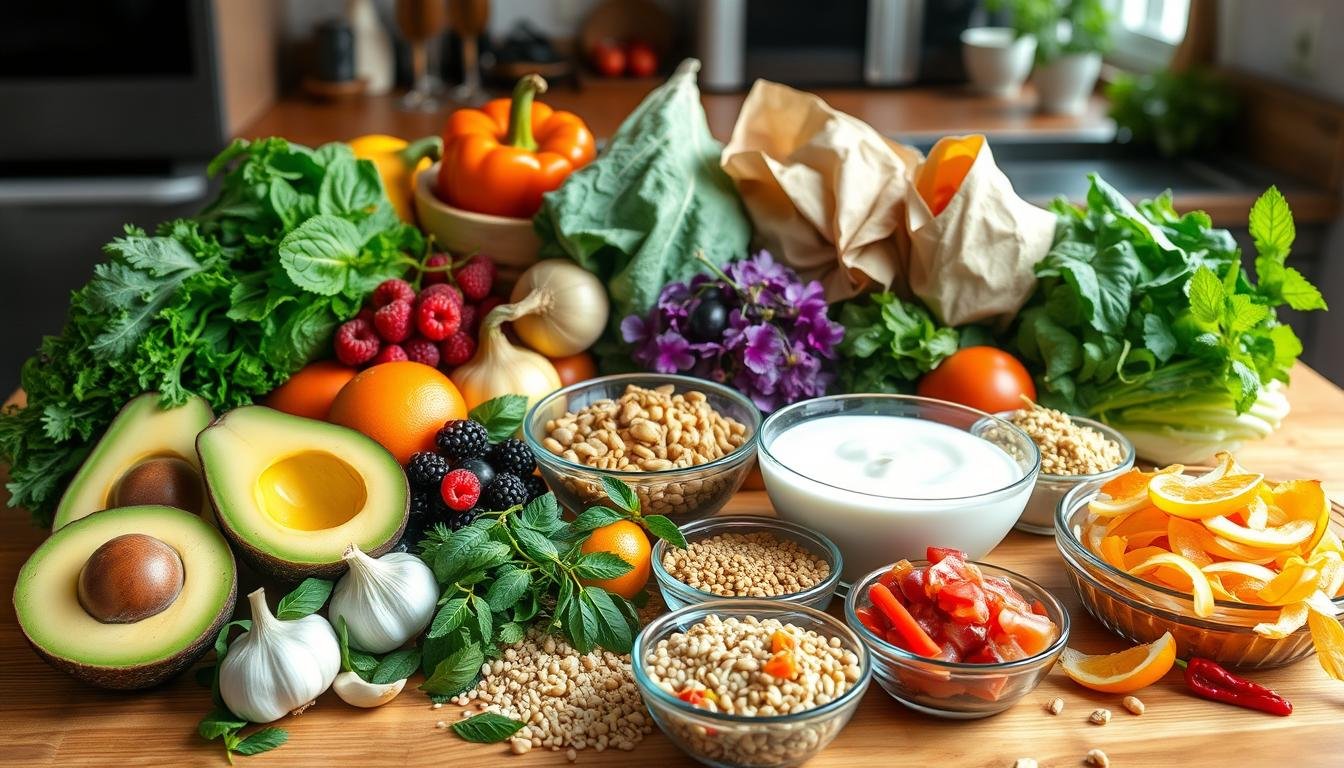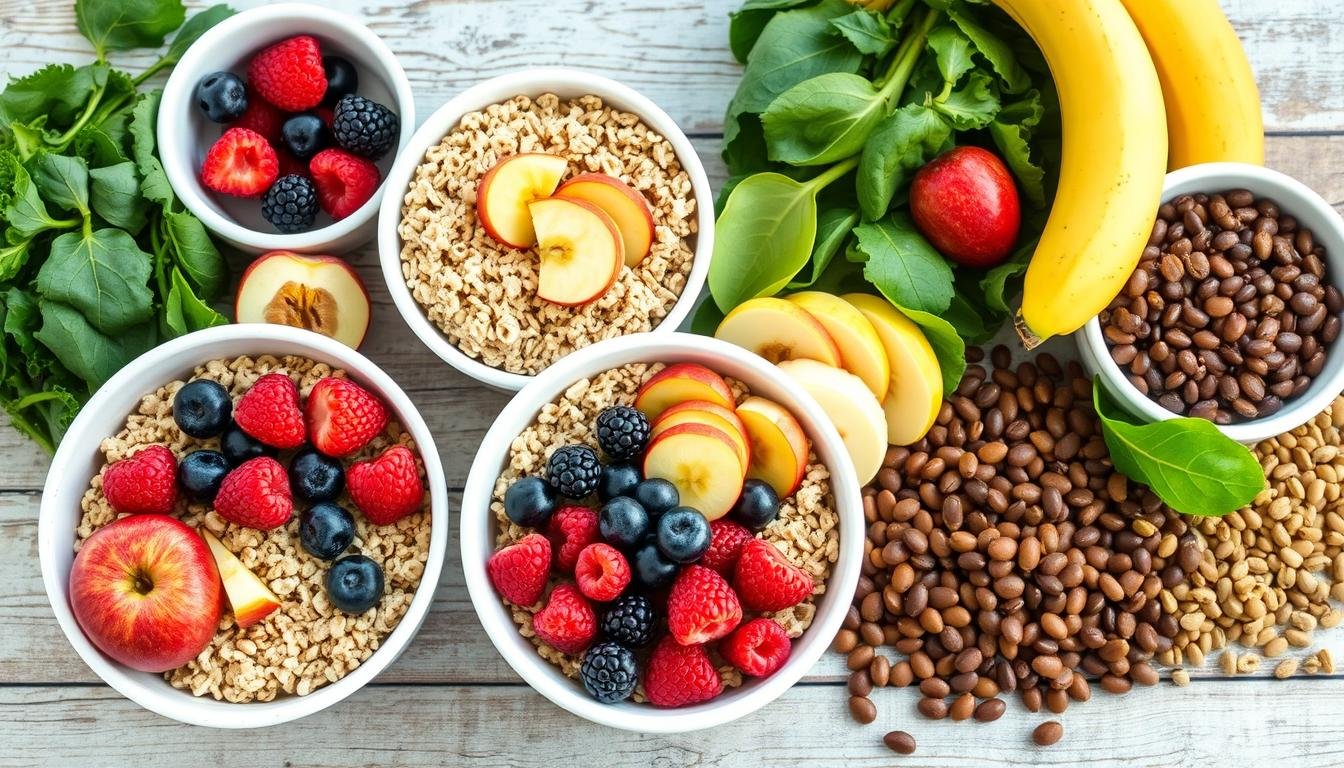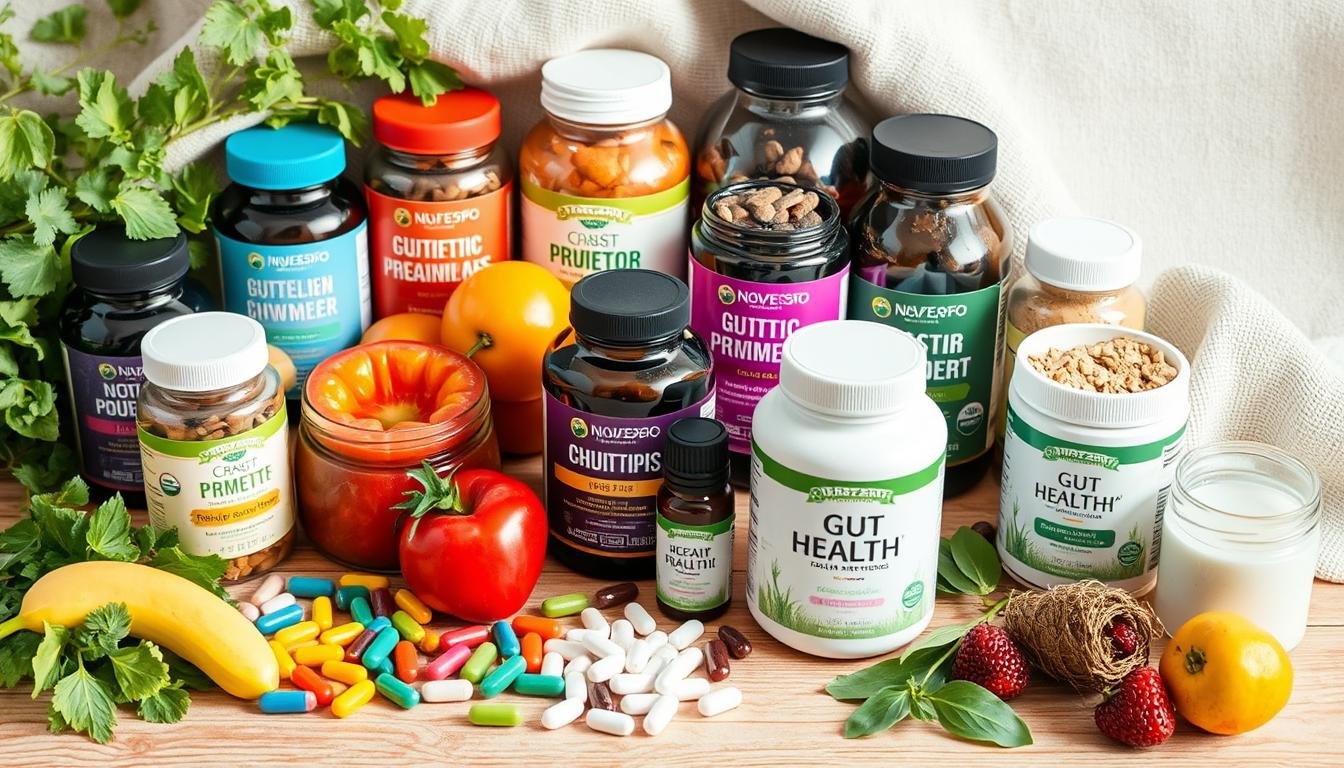Did you know that 70% of your immune system is in your gut? A healthy digestive system is key to your overall wellness. By eating right, you can boost your gut health and improve your immune system.
In this guide, we’ll share important nutrition tips for better gut health. We’ll explore how what you eat affects how you feel. With a healthy gut, you can maintain long-term health.
Let’s dive into balanced diets, probiotics, and fiber-rich foods. These can help you feel better from the inside out.
The Importance of a Healthy Gut
A healthy gut is key to feeling good overall. It helps with many body functions. Keeping your gut microbiome in balance boosts your immune system support. This helps your body fight off infections better.
Also, research shows a link between gut health and mental health. Our digestive system and brain are closely connected. Eating right can make you feel happier and sharper.
Studies also find that a balanced gut helps prevent chronic diseases. Experts like Dr. Alessio Fasano from Harvard Medical School say it’s important. A healthy gut reduces body-wide inflammation.
| Health Aspect | Role of Healthy Gut |
|---|---|
| Immune System | Regulates immune responses and protects against infections |
| Mental Well-Being | Influences mood and cognitive functions through the gut-brain axis |
| Chronic Disease Prevention | Aids in controlling inflammation and preventing diseases like diabetes |
What you eat greatly affects your gut health. Eating a variety of nutritious foods helps your digestion and immune system. Good nutrition and gut health are the bases of physical and mental well-being.
Gut-Friendly Diet for Optimal Health
A diet that’s good for your gut is key to staying healthy. Eating whole foods and cutting down on processed ones helps. This way, you support your gut’s health and overall well-being.
Incorporating Whole Foods
Eating a variety of whole foods is important for a healthy gut. Foods like fruits, veggies, whole grains, and lean proteins are great. They give your gut the nutrients it needs to work well.
Adding leafy greens, berries, nuts, seeds, and legumes to your meals is a good idea. They make your food taste better and help your gut stay healthy. Whole foods are a natural way to keep your body nourished and your digestive system in check.
Garden of Life Probiotics for Men Dr Formulated 50 Billion CFU 15 Probiotics for Digestive Health
Limiting Processed Foods
It’s important to eat fewer processed foods for a healthy gut. These foods often have additives and unhealthy fats that can harm your gut. Cutting down on processed foods can help prevent inflammation and other digestive problems.
Choose natural, unprocessed foods whenever you can. Cooking at home with fresh ingredients helps you avoid processed foods. This is good for your gut and your overall health.
Probiotics for Gut Health
Probiotics play a key role in keeping our gut healthy. They help balance the good bacteria in our gut. To keep our gut healthy, we should eat probiotic-rich foods and take supplements.
Best Probiotic Foods
There are many foods that are full of good bacteria. These foods help our digestion and keep our gut healthy. Here are some of the best probiotic-rich foods:
- Yogurt: A great source of Lactobacillus.
- Kefir: A fermented drink with many probiotics.
- Sauerkraut: Fermented cabbage full of probiotics and enzymes.
- Miso: A fermented soybean paste from Japan.
- Kimchi: A spicy Korean dish made from fermented veggies.
Benefits of Probiotic Supplements
Probiotic supplements can give you an extra boost. They offer many probiotic supplements benefits for our gut health, such as:
- Improved Digestion: They help break down food and prevent digestive problems.
- Enhanced Immune Function: A healthy gut supports a strong immune system.
- Reduced Inflammation: They can lower inflammation in the gut and its symptoms.
- Better Mental Health: A healthy gut can improve our mood and thinking.
Eating probiotic-rich foods and taking supplements is a good way to keep our gut healthy. Always choose supplements that are scientifically proven. Talk to a healthcare professional to find the best one for you.
Nutrition Tips for Improving Gut Health
Improving your gut health is a journey that needs a focused diet. By following nutrition tips for improving gut health, you can see big changes. Start with personalized nutrition plans. These plans are made just for you, based on your digestive needs.
Here are some key dietary changes for better gut health:
- Increase Fiber Intake: Foods like fruits, veggies, and whole grains help digestion and grow good bacteria.
- Stay Hydrated: Drinking enough water is key for digestion and smooth bowel movements.
- Mindful Eating: Eating slowly and chewing well helps absorb nutrients better and reduces stomach issues.
Getting personalized nutrition is crucial. A nutritionist can create a meal plan just for you. This plan will address your specific needs, like food allergies or intolerances.
Also, making smart dietary adjustments for gut health means adding good foods and cutting out bad ones. Avoiding processed and sugary foods can help reduce inflammation and improve your gut health.
Benefits of Probiotic Supplements
For a better understanding, check out the table below. It lists important foods and how they help your gut:
| Food | Role in Gut Health |
|---|---|
| Yogurt | Rich in probiotics, which help balance the gut microbiome. |
| Leafy Greens | High in fiber, supporting regular bowel movements. |
| Whole Grains | Provide prebiotics that feed beneficial gut bacteria. |
| Fermented Foods | Enhance gut flora diversity with beneficial bacteria. |
| Berries | Packed with antioxidants and fiber that support digestive health. |
Adding these foods and following nutrition tips for improving gut health can lead to a balanced digestive system.
Understanding the Gut Microbiome
The gut microbiome is a complex ecosystem filled with trillions of microorganisms. These include bacteria, viruses, and fungi in your digestive tract. They are key to keeping your digestive system healthy and your overall health in check. As research grows, we see how deeply connected the gut microbiome is to our bodies.
The Role of Healthy Gut Bacteria
Healthy gut bacteria are vital for digesting food and making important vitamins. They help break down carbs, proteins, and fats, making sure you get the nutrients you need. Without enough good bacteria, your digestive health can suffer, causing many problems.
How Gut Microbiome Affects Overall Health
The gut microbiome’s influence goes beyond digestion. It affects many areas of your health. The gut-brain axis is a key area of study. It shows how your gut health can impact your mood, mental state, and even your brain function.
Also, an unbalanced gut microbiome can increase the risk of diseases like obesity, diabetes, and heart disease. Keeping your gut microbiome diverse and balanced is key to reducing inflammation and improving long-term health.
| Component | Function |
|---|---|
| Healthy Gut Bacteria | Digestion and nutrient absorption |
| Gut-Brain Axis | Mind-gut communication affecting mental health |
| Inflammation Regulation | Reducing risk of chronic diseases |
| Immune System Modulation | Protection against pathogens |
| Vitamin Production | Synthesis of essential vitamins |
Fiber-Rich Foods for Gut Health
Eating foods high in fiber is key for good digestion. Fiber is vital, and it comes in many forms. Knowing about dietary fiber types helps you make better food choices for digestion and health.
Types of Dietary Fiber
There are two main types of dietary fiber: soluble and insoluble. Both are important for your gut health.
- Soluble fiber turns into a gel when mixed with water. It can lower cholesterol and blood sugar. Find it in oats, peas, beans, apples, and citrus fruits.
- Insoluble fiber helps move food through your system. It keeps you regular and prevents constipation. You can find it in wheat bran, veggies, and whole grains.
Benefits of High-Fiber Diets
Eating a lot of fiber has many benefits. It’s not just for digestion. A high-fiber diet can also lower disease risk and help you stay at a healthy weight.
- Regular Bowel Movements: Fiber makes stool bulkier, making it easier to pass. It also cuts down on constipation.
- Diverse Gut Microbiota: Fiber foods help good bacteria grow in your gut. This keeps your gut microbiome balanced and healthy.
- Reduced Disease Risk: Eating a lot of fiber can lower your risk of heart disease, stroke, and diabetes.
| Dietary Fiber Type | Sources | Benefits |
|---|---|---|
| Soluble Fiber | Oats, peas, beans, apples, citrus fruits | Lowers blood cholesterol, helps control blood sugar levels |
| Insoluble Fiber | Wheat bran, vegetables, whole grains | Promotes regularity, prevents constipation |
In conclusion, knowing about dietary fiber types and their roles is good for your gut. Eating a high-fiber diet is a natural way to boost your health and digestion.
Gut-Healing Foods to Include in Your Diet
Keeping your gut healthy is key to feeling good. Eating foods that heal your gut can boost your digestion. Let’s look at some foods that can help your gut feel better.
Fermented Foods
Fermented foods are great for your gut. They have probiotics that help good bacteria grow. Yogurt, kefir, and sauerkraut are all good choices.
Eating fermented foods can improve digestion and help you absorb nutrients better. It also boosts your immune system. Adding these foods to your diet can really help your gut health.
Prebiotic Foods
Prebiotic foods feed the good bacteria in your gut. Foods like garlic, onions, and asparagus are full of prebiotics.
These foods keep your gut balanced. They help your digestive system work better, reduce inflammation, and improve your gut health. Eating prebiotic foods regularly is important for a healthy gut.
Digestive Health Tips for Daily Life
Keeping your digestive system healthy is all about daily habits. Drinking enough water and exercising regularly are key. Knowing how these habits help your gut can make them easier to follow.
Hydration and Gut Health
Drinking water helps food move smoothly through your body and prevents constipation. It’s crucial for breaking down food, absorbing nutrients, and getting rid of waste.
- Start your day with a glass of water.
- Carry a reusable water bottle to ensure regular intake.
- Incorporate hydrating foods like cucumbers and watermelons into your diet.
Regular Physical Activity
Exercise is great for your gut, helping food move and keeping your gut bacteria balanced. Mix up your workouts with cardio, strength training, and flexibility exercises for the best results.
Here’s how to add exercise to your daily routine:
- Do at least 30 minutes of moderate exercise, like walking, jogging, or cycling, most days.
- Combine cardio with strength training for a well-rounded workout.
- Try yoga or stretching to help your digestion and reduce stress.
Following these tips can greatly improve your health. By drinking enough water and exercising every day, you’ll have a healthier gut and a better lifestyle.
Gut Health Supplements: What You Need to Know
For those looking to boost their health, gut health supplements are a great choice. There are many types of supplements that help with digestion. Each one has its own benefits.
Prebiotics and probiotics are key. They add good bacteria to your gut, helping it stay balanced. Probiotics are live bacteria that offer health benefits. Prebiotics feed these bacteria, helping them grow.
Digestive enzymes are also vital. They help break down food and absorb nutrients. Taking digestive enzymes can improve how your body uses nutrients, reducing bloating and indigestion.
When picking gut health supplements, supplement safety is crucial. Choose products from trusted brands that follow quality standards. Look for NSF International or USP Verified to ensure safety and effectiveness.
- Always talk to a healthcare professional before starting new supplements. This ensures they’re safe for you.
- Learn about the supplement’s ingredients and how much to take. This helps you understand its effects and benefits.
- Check out what others say and look at scientific studies. This helps you see if the supplement works well and is safe.
To make smart choices, consider this table:
| Supplement Type | Benefits | Considerations |
|---|---|---|
| Prebiotics and Probiotics | Balance gut microbiome; enhance digestion | May require specific storage; consult for dosage |
| Digestive Enzymes | Improve nutrient absorption; reduce bloating | Check for allergens; understand dosage |
By picking the right gut health supplements and getting advice from experts, you can greatly improve your digestion and overall health.
Conclusion
In this guide, we’ve covered key points for better gut health and digestion. We talked about the importance of a healthy gut and how to eat right for it. We also looked at the benefits of probiotics and the role of the gut microbiome.
Eating a balanced diet with whole and fiber-rich foods is crucial. Foods like fermented and prebiotic ones help your gut. Avoiding processed foods also keeps your gut balanced. Drinking enough water and staying active are simple ways to help your digestion every day.
Choosing the right foods and lifestyle is key to feeling your best. By following the tips we shared, you can improve your gut health. This will help your overall health and wellness. Start making these changes today for lasting benefits.

